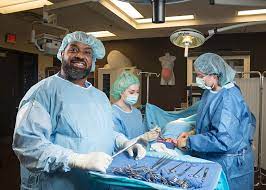
The Crucial Role of a Surgical Technologist in the Operating Room
The Role of a Surgical Technologist in the Operating Room
When it comes to ensuring a smooth and successful surgical procedure, the role of a surgical technologist is indispensable. These skilled healthcare professionals play a crucial part in the operating room, assisting surgeons and nurses in various tasks before, during, and after surgery.
Responsibilities of a Surgical Technologist
From preparing the operating room and sterilizing equipment to handing instruments to surgeons during procedures, surgical technologists are responsible for maintaining a sterile environment and ensuring that all necessary tools are readily available. They also assist in patient preparation, positioning, and draping.
Importance of Attention to Detail
One of the key qualities of a successful surgical technologist is attention to detail. They must be meticulous in their work, carefully following protocols and procedures to minimize the risk of infections and complications during surgery. By double-checking instruments and supplies, they help maintain the safety and well-being of patients.
Teamwork and Communication Skills
Effective communication and teamwork are essential skills for surgical technologists. They must be able to anticipate the needs of surgeons and other team members, as well as communicate clearly and efficiently during high-pressure situations. By working closely with surgeons, nurses, anesthesiologists, and other healthcare professionals, surgical technologists contribute to the overall success of surgeries.
Educational Requirements
Becoming a surgical technologist typically requires completion of an accredited surgical technology program, which may result in a diploma, certificate, or associate degree. Additionally, many employers prefer certification through organizations such as the National Board of Surgical Technology and Surgical Assisting (NBSTSA) or the National Center for Competency Testing (NCCT).
Career Outlook
The demand for skilled surgical technologists is expected to grow as advancements in medical technology continue to drive an increase in surgical procedures. With opportunities in hospitals, outpatient centers, and physician offices, this rewarding career offers stability and job satisfaction for those passionate about healthcare.
8 Reasons Why a Career as a Surgical Technologist is Rewarding and In-Demand
- Essential role in ensuring a smooth and successful surgical procedure
- Opportunity to work closely with surgeons and other healthcare professionals
- Contribute to maintaining a sterile environment in the operating room
- Variety of tasks, from preparing the operating room to handing instruments
- High demand for skilled surgical technologists in the healthcare industry
- Potential for career advancement through certification and experience
- Job satisfaction from directly impacting patient outcomes and well-being
- Stable job outlook with opportunities in hospitals, outpatient centers, and physician offices
Challenges of Being a Surgical Technologist: Physical Demands, High Stress, and Health Risks
- Physically demanding work that may involve long hours of standing during surgical procedures.
- Exposure to stressful and high-pressure situations in the operating room, which can be emotionally challenging.
- Risk of potential exposure to infections and communicable diseases due to close contact with patients and surgical equipment.
Essential role in ensuring a smooth and successful surgical procedure
Surgical technologists play an essential role in ensuring a smooth and successful surgical procedure by meticulously preparing the operating room, sterilizing equipment, and providing surgeons with the necessary instruments during surgery. Their attention to detail and dedication to maintaining a sterile environment help minimize the risk of infections and complications, ultimately contributing to the safety and well-being of patients undergoing surgery. With their expertise and teamwork skills, surgical technologists are indispensable members of the healthcare team, playing a critical role in the overall success of surgical procedures.
Opportunity to work closely with surgeons and other healthcare professionals
One significant advantage of being a surgical technologist is the opportunity to work closely with surgeons and other healthcare professionals. By collaborating closely with these experts in the operating room, surgical technologists gain invaluable experience and knowledge. They have the chance to witness firsthand the intricacies of surgical procedures, learn from seasoned professionals, and contribute directly to patient care. This close working relationship not only fosters professional growth but also enhances teamwork and communication skills, ultimately leading to a more rewarding and fulfilling career in healthcare.
Contribute to maintaining a sterile environment in the operating room
Surgical technologists play a critical role in maintaining a sterile environment in the operating room, ensuring the safety and well-being of patients undergoing surgery. By meticulously sterilizing equipment, preparing the operating room, and following strict protocols for infection control, surgical technologists help prevent the spread of harmful bacteria and reduce the risk of surgical site infections. Their attention to detail and commitment to upholding high standards of cleanliness contribute significantly to creating a safe and hygienic environment for surgical procedures to take place, ultimately promoting positive patient outcomes.
Variety of tasks, from preparing the operating room to handing instruments
Surgical technologists benefit from a diverse range of responsibilities, encompassing tasks that range from meticulously preparing the operating room to skillfully handing instruments during surgical procedures. This variety not only showcases their adaptability and attention to detail but also underscores their crucial role in maintaining a sterile environment and facilitating the smooth progression of surgeries. By seamlessly transitioning between different tasks, surgical technologists play a vital part in ensuring the efficiency and success of operations, ultimately contributing to positive patient outcomes and overall surgical team effectiveness.
High demand for skilled surgical technologists in the healthcare industry
The healthcare industry is experiencing a high demand for skilled surgical technologists, making it a promising career path for those interested in the field. As advancements in medical technology lead to an increase in surgical procedures, the need for qualified professionals to assist in the operating room continues to grow. Surgical technologists play a critical role in ensuring the smooth and safe execution of surgeries, and their expertise is highly sought after by hospitals, outpatient centers, and physician offices. This demand not only offers job stability but also highlights the valuable contribution that surgical technologists make to the healthcare system.
Potential for career advancement through certification and experience
Surgical technologists have a promising pro in the potential for career advancement through certification and experience. By obtaining certifications from reputable organizations and accumulating hands-on experience in various surgical settings, surgical technologists can enhance their skills and expertise, opening doors to higher-paying positions, leadership roles, and specialized areas of practice within the healthcare field. This avenue for professional growth not only offers financial benefits but also allows surgical technologists to continuously expand their knowledge and contribute meaningfully to the delivery of quality patient care.
Job satisfaction from directly impacting patient outcomes and well-being
Surgical technologists experience a high level of job satisfaction stemming from their direct impact on patient outcomes and well-being. By meticulously preparing operating rooms, ensuring the availability of necessary instruments, and assisting surgeons during procedures, surgical technologists play a critical role in the success of surgeries. Knowing that their attention to detail and expertise contribute to positive patient outcomes brings a deep sense of fulfillment and purpose to their work. This direct connection to improving the lives of patients makes the role of a surgical technologist incredibly rewarding and meaningful.
Stable job outlook with opportunities in hospitals, outpatient centers, and physician offices
Surgical technologists enjoy a stable job outlook with a wide range of opportunities available in hospitals, outpatient centers, and physician offices. As advancements in medical technology drive an increase in surgical procedures, the demand for skilled surgical technologists continues to grow. This career path offers not only stability but also the satisfaction of playing a vital role in ensuring the safety and success of surgical procedures across various healthcare settings.
Physically demanding work that may involve long hours of standing during surgical procedures.
One significant con of being a surgical technologist is the physically demanding nature of the job, which often requires long hours of standing during surgical procedures. The continuous standing and physical exertion can lead to fatigue, discomfort, and potential musculoskeletal issues for surgical technologists. This aspect of the job highlights the importance of proper ergonomics and self-care practices to mitigate the physical strain associated with their crucial role in the operating room.
Exposure to stressful and high-pressure situations in the operating room, which can be emotionally challenging.
One significant challenge faced by surgical technologists is the exposure to stressful and high-pressure situations in the operating room, which can be emotionally taxing. The fast-paced nature of surgical procedures, coupled with the need for precision and quick decision-making, can lead to intense moments that may impact the well-being of surgical technologists. Managing emotions and staying focused amidst such pressure requires resilience and emotional strength, highlighting the demanding nature of this crucial healthcare role.
Risk of potential exposure to infections and communicable diseases due to close contact with patients and surgical equipment.
One notable con of being a surgical technologist is the inherent risk of potential exposure to infections and communicable diseases. This risk arises from the close contact that surgical technologists have with patients undergoing procedures and the surgical equipment used during operations. Despite strict adherence to safety protocols and infection control measures, the nature of their work places them in direct proximity to bodily fluids and contaminated surfaces, increasing the likelihood of exposure to pathogens. Vigilance and proper protective measures are essential for mitigating this occupational hazard and safeguarding the health and well-being of surgical technologists.



